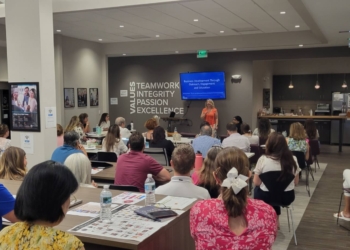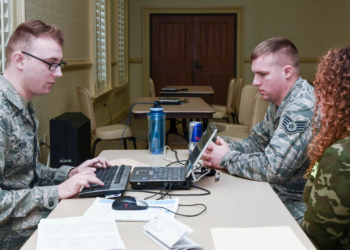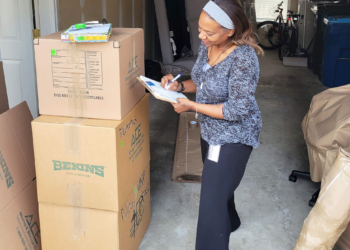I remember when my mental health started to spiral out of control.
We had just PCS’d to our current duty station, and I was having a hard time adjusting to the changes brought forth by the move. Throughout my life, I have struggled with anxiety.
After relocating and leaving my support system behind, I struggled with loneliness. My husband’s schedule changed, my children were unsettled, and I was caring for everyone else’s needs above my own.
Seeking help from dark thoughts
I started to have what I call “dark” thoughts — and they scared me. So, I sought help.
I called the base clinic and scheduled an appointment with my new Primary Care Manager (PCM). They were able to fit me in within two days. During my appointment, I told my PCM what I was experiencing. He directed me over to the mental health office. There, a counselor recommended I attend one of her seminars to “change my thinking.” I walked out with a pamphlet for a class, feeling worse than I did before, and with no tangible help for mental health resources.
Shortly after, I followed up with my PCM and he prescribed an anti-anxiety medication called Zoloft and wished me luck. I still didn’t have the answers I needed. My depression continued to worsen.
A few weeks later I learned that I didn’t need a referral to seek help off base. This was something that my providers neglected to tell me and should have known.
Finally, a diagnosis
Luckily, I found a TRICARE-authorized clinical psychologist and scheduled my appointment within a week without a referral. Here, I received a dual diagnosis of Attention Deficit Hyperactivity Disorder and Complex Post-Traumatic Stress Disorder as a result of past trauma. I have been receiving Cognitive Behavioral Therapy for over a year, and I am now properly medicated.
The result? I’m flourishing in ways I never knew I could, and I can uphold our family in times of crisis without losing my sanity.
Related: Navigating EFMP with ease.
Since my diagnosis, I have spoken openly about my experiences in the hopes of ending the stigma surrounding mental healthcare in the military community and reaching other spouses who may be in the same predicament.
If you find yourself in need of mental health resources, here are steps you can take to get help through TRICARE:
1. Visit the TRICARE website to search for an authorized provider near you.
TRICARE’s website is transparent about its mental health coverage. It gives a full breakdown of the types of mental health providers out there and what each of them can do to help their patients. For more information and to search for a provider, click here. You also have the option of asking your PCM for a recommendation — you will likely have a better experience than I did. If not, at least make sure to let your PCM know that you are seeking treatment, as they may be able to help you manage your medications if needed.
2. Schedule an appointment with a counselor to discuss your mental health needs.
You can schedule an appointment with a TRICARE-authorized mental health provider without a referral. However, you will need a referral for a psychoanalysis or mental health evaluation. This is something your mental health provider will most likely be able to assist you with.
3. If you are diagnosed, inform the Exceptional Family Member Program (EFMP) coordinator.
This step is required if you receive a diagnosis regarding your mental health. They are usually located in the clinic of your local installation. The EFMP coordinator can help you coordinate your treatment and make sure you continue to receive services — no matter where you PCS — by registering for the EFMP program. Click here for more information regarding all of the services provided by EFMP.
Some additional resources to consider for mental health assistance:
- Military OneSource also offers free non-medical counseling. If you are unsure of the type of help you need, or you and your family are facing some difficulties related to military life, Military OneSource can help. They provide non-medical counseling to families to help build resilience. If they can’t help, they can help you find better resources depending on your needs. Call their toll-free line at 800-342-9347 (CONUS) or visit their international directory for OCONUS calling options.
- Your local Military Family-Life Counselor (MFLC). MFLCs are counselors that specialize in helping military families overcome most of the obstacles that military life brings. They can also help you seek outside help, should you need it, and provide you with additional resources regarding your situation.
If you or a loved one is contemplating suicide, please call the National Suicide Prevention hotline at 800-273-8255.







































